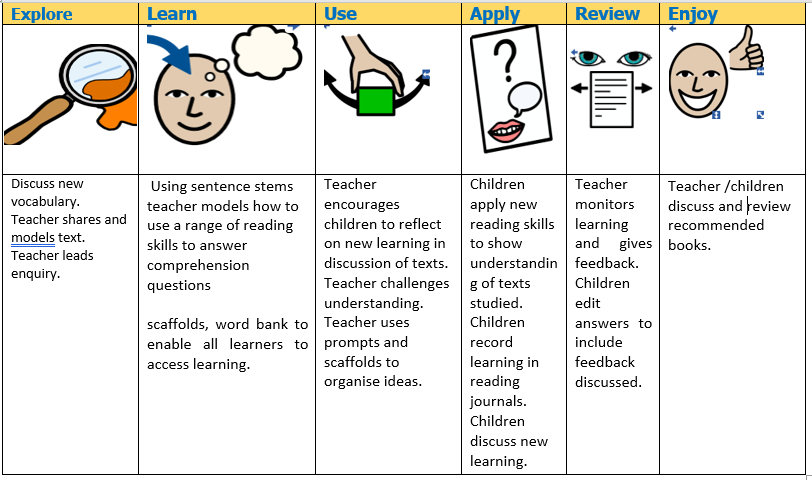Reading in Key Stage 2
Holy Family Book Corners
Every classroom has a book corner to support the children’s learning as well as nurture a love of reading. Each book corner is used to promote reading for pleasure and contains books linked to each topic. This encourages children to deepen their knowledge in the foundation subjects. These books change with each topic to ensure children are exposed to a variety of texts across the curriculum.
Focused Readers
At Holy Family we follow the Mastery approach to reading. Our class readers support our learning in English and relate to the Topic being studied. We select books which will engage our children, enhance our foundation subjects and expose our children to rich language.
The planned reading curriculum is supported by access to, and carefully designed exposure to, high quality literature (class readers). These books have been chosen to reflect a rich variety of cultures, backgrounds and experiences. Our Holy Family reading spine shows our class readers.
Reading For Pleasure
Reading for pleasure exposes children to a range of experiences. It gives them the opportunity to use their imagination to explore new ideas, visit new places and meet new characters. Reading for pleasure also improves children’s well-being and empathy.
Research shows that reading for pleasure can be directly linked to children’s success throughout their time at school and even into adulthood.
Therefore, our teachers read aloud to the children daily. Having this ritual allows our children to enjoy and access texts that are usually above their fluency level. It also gives our teachers the opportunity to model high quality reading aloud skills, an area covered in the National Curriculum.
Daily Reading
In Key stage 2, we follow the ‘Explore, Learn, Use, Apply, Review and Enjoy’ approach to teaching the skills of reading. Our reading sessions take place daily as a whole class. Children study a variety of texts which might be fiction, non-fiction or poetry. In each session, the teachers model the reading of texts and the children practise and develop fluency. In Year 2, children begin to follow this approach in the Summer Term.

It is written in the National Curriculum that children who have been identified as working within the lowest 20% must be monitored and tracked to close gaps.
Children who have been identified as working within the lowest 20% participate in 1:1 or group interventions during the school day. Children who are still learning to decode will take home a decodable text. Decodable texts are books that match a child’s phonic knowledge. The book progression is marked by sound knowledge linked to our Little Wandle Catch up Phonics scheme.
Children in Key stage 2 who are ‘learning to read’ continue to read decodable texts matched to their phonic knowledge. These children will become ‘regular readers’ to give them the opportunity to develop fluency by reading 1:1 with a teacher.
Children who require additional phonics support will continue to have group intervention using the Little Wandle Catch-up programme.
Our highly skilled inclusion team provide intervention for children who need support to meet the expected reading standard for their year group, especially transitioning from KS1 to KS2. Our team offer personalised small group sessions that focus on fluency and/or comprehension skills using Little Wandle Catch-Up, Tracks and Reading Detectives.
How is Reading Assessed?
In Year 1 to Year 6, children complete Reading assessments, which provide standardised scores. Each term, teachers use the evidence from the Reading lessons, standardised scores from assessments and teacher observations of pupils to formulate a Teacher Judgement based on the year group expectations. Progress reports allow all staff to monitor progression and engage in a discussion with the inclusion team to plan the provisions to support need. The Inclusion Team also conduct Yarc assessments when further targeted support is required.
Progression of Skills and Knowledge
Our Progression of Skills and Knowledge documents inform our planning. The National Curriculum objectives are listed in each term. The objectives are mapped out for progression across the year.
100 Best Books for ages 0-5
100 Best Books for ages 6-8
100 Best Books for ages 9-11
